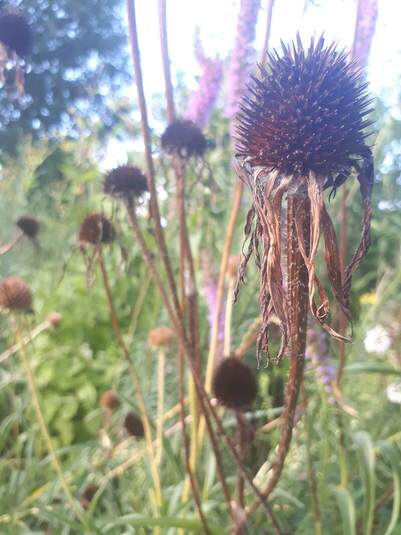 - We’ve had many questions from our followers about maintaining a fall/winter pollinator garden. As one gardener put it, “What should I do to avoid my garden getting overrun with seeds that will then create more plants, and ultimately, I will have to do more weeding?” This gardener says she is conflicted between leaving the stems for insects to overwinter or cutting them back. Charlie Briggs, gardener at Royal Botanical Gardens (RBG), suggests the following: "During late fall (like late November), once birds have had their harvest I remove any seed heads from my plants that I know to be aggressive seeders by snapping or using pruners This usually does not include plants that I know have seedlings that are easy to pull out if they do germinate, or ones whose seedlings I will share with other gardeners or use to fill holes in my own gardens." Charlies says that at this time, he also removes as much height or weight as needed from plants "that will collapse to a point of untidiness or inconvenience--like the native Giant Sunflower next to my driveway. All 10 feet of it will become messy in the winter so I cut it's stalks back to about 3 or 4 feet knowing that it will support itself through the season and provide great habitat for overwintering insects while not disturbing my passage to the side of my house." Charlie removes height using Pruners, Loppers, Saw, "whichever the task calls for."
1 Comment
Debbie Lindeman and Dennis Price; Hamilton Monarch Awards 2020 Recipients.
When Debbie moved into Dennis’ Hamilton Mountain home, Rymal road, there were already Carolinian tree species on this ⅓ of an acre-sized lot. First-time applicants of the Monarch Awards 2020, the couple have been planting gardens for nature since 2012. They are seated shoulder to shoulder for this zoom conversation. “Which of you has the green thumbs?” I ask. “My green thumbs are more with my veggie garden,” Dennis says, “but I just did a pollinator garden on the front lawn though.” “Before meeting Dennis, I was very ‘plant-blind,’” Debbie turns to Dennis, “now I am getting to know more plants than he does,” she jokes. “I’m beginning to forget names. I’m still working, so I don’t have enough time,” Dennis defends himself, “but I’ll pick it up again when I retire.”  Guest blogger, C. Coon. Guest blogger, C. Coon. Welcome to our 13-year old, guest-blogger, Catherine Coon. Catherine interviewed 13-year old, Maia Whitman about her experience, receiving a Caterpillar Award (a Hamilton Monarch Awards' "beginner-level" award of excellence, for gardens that nature loves, by gardeners who love nature). First, a little bit about Catherine. In her own words she says: "I love anime and cuddling with my cats while writing and reading. I'm passionate about the environment, and think that being involved in any way we can is important." In reviewing Maia's application for the Monarch Awards, we can see the two have a lot in common. Maia, who applied on behave of her family, told us that she loves pollinators. She wrote about her garden's "many pollinatr-friendly features": "For starters, our front lawn has been seeded with clover and it is slowly taking over the grass! When the clover blooms, the bees and bumblebees are everywhere! Another feature is our Linden Tree. It is about to bloom, and we are eagerly awaiting what we like to call the annual Bee Day! Once a year, for a day or two, the tree blooms and the honey bees go crazy - you can hear them from the house!" And now for Catherine's Q & A with Maia!  We caught up with our amazing volunteer judges to hear their thoughts on judging the many 2020 Monarch and Caterpillar Awards’ gardens. Erin Mallon, Landowner Outreach Technician with Conservation Halton. Erin is involved with the Cootes to Escarpment project and does invasive species management. She is working on the management action plan with the City of Hamilton, integrative management, chemical controls. She’s excited about the idea of using goats, like they do in Europe, to curtail invasive species. Why the interest in judging? I was interested in being a judge for the initiative for both personal and professional reasons. Professionally, I try to educate people on the importance of urban stormwater management, as well as native species landscaping. Personally, I think the Monarch Awards is a great initiative to raise awareness and give some recognition to those gardeners who do so to benefit nature. Using neighbours to spread the word is so much more meaningful, it’s a more lateral approach, than top-down. In my own garden, I’ve got all kinds of native plants, but I’m not quite there yet [for an Award], so this is a good opportunity to see what is working for others, learning first hand through these great gardens, how plants get along. I’m building a network and learning so much from this initiative, while at the same time, sharing my knowledge. Notable observations?
The number one thing to mention is the absolute enthusiasm from the gardeners--they are excited, are good at troubleshooting and networking, they are a wealth of knowledge, and they are proud of their gardens. As well, there is a diversity of people--not your typical gardener--and a lot of ingenuity in some of the ways they use space, source plants, interact with the neighbours; there’s a lot going on. Favourite thing about your experience judging? I enjoyed the gardens--they are all dynamic and unique. One Ancaster resident has a really neat property, the front yard is so beautiful. 98% of the plants are native. She had silk moths. I saw caterpillars and eggs on this urban property. She had a permeable driveway, lots on the neat pathways, a tulip tree, paw-paw trees, a Monarch Waystation, big pond-- all inspiring. I was blown away! Challenges to judging/least favourite part? No challenges, but you know, some of the gardens don’t quite meet all the criteria, so it can be disappointing for some applicants, but I say, try again next year. Laurie Brady, Caterpillar Award Winner, 2019 . The Caterpillar Awards are a subset of the Hamilton Monarch Awards, awards of excellence for gardeners who garden in support of nature. To apply for either award in 2020, click here. Deadline is June 21. Laurie Brady moved to Hamilton three years ago from Ottawa. With her dogs Harry and Teddy, she enjoys exploring her new Kirkendall neighbourhood for historical heritage buildings (her background is in this field) which is how she first spotted our Pollinator Paradise “We are Feeding Pollinators” signs in the various gardens and at the Unitarian Church on Dundurn. “I thought that was pretty cool. I decided to learn more about the project, and subsequently, the Monarch and Caterpillar Awards” she recalls. As a renter, Laurie says she wanted to garden with minimal expense, water usage, and upkeep. “I've been cultivating a native garden in an economical way, taking advantage of local plants, rain barrel and compost sales, or transplants from my parents' pollinator garden.” Alex Stewart and James Honey: Hamilton Monarch Awards' Winners 2019.
Alex Stewart attributes his current self-employment, and that of his partner, James Honey as local gardeners to thespec.com reporter, Kathy Reinwald who wrote about their Wellington Street garden four years ago. Their corner street urban garden has brought colour and vibrancy to this busy arterial road, on a truck-route, that has very little tree canopy and other greenery. “There was not a single flower in sight,” Alex recalls, at the time of moving to the neighbourhood. The property itself was full of rubble. “We dove in headfirst and replaced 200 species in the garden, swapping them out for native species; every plant had to have a pollinator attached to it, for example, Spicebush for Swallowtail butterflies.” The Hamilton Monarch Awards--for gardens that nature loves, by gardeners who love nature--are back for another year and we invite you to apply.
Started in 2016 by a group of Hamilton gardeners and activists, concerned about declines in populations of pollinator species, the award celebrates people who create habitat in their yards in support of pollinators and wildlife in general. It recognizes people who create naturalized, sustainable gardens that are beautiful, functional and beneficial to nature. Now more than ever, with the critical need for healthier nature, we want to acknowledge the validity of this non-traditional aesthetic, ecological approach. For more about the Monarch Awards and the beginners' award, The Caterpillar Awards, and what it takes to receive an award, click here. We continue our blog post series featuring Hamilton Monarch Awards' and Caterpillar Awards' winners 2019 in the hope that you too will be inspired to apply this year. In this post, we hear from Deborah Boyd, Caterpillar Award recipient. Deborah has been gardening for over a decade, but really “got turned on to native species plants” a few years ago, after a conversation with Cherish Gamble of the Hamilton Conservation Authority. Coinciding with her concerns at the time about declining Monarch populations, Cherish helped Deborah understand their importance for pollinator health: “That’s how I became passionate; creating habitat that supports all life,” she recalls. “It has become a spiritual experience, hands in the earth, feeding the soil and plants, the whole cycle of life.” 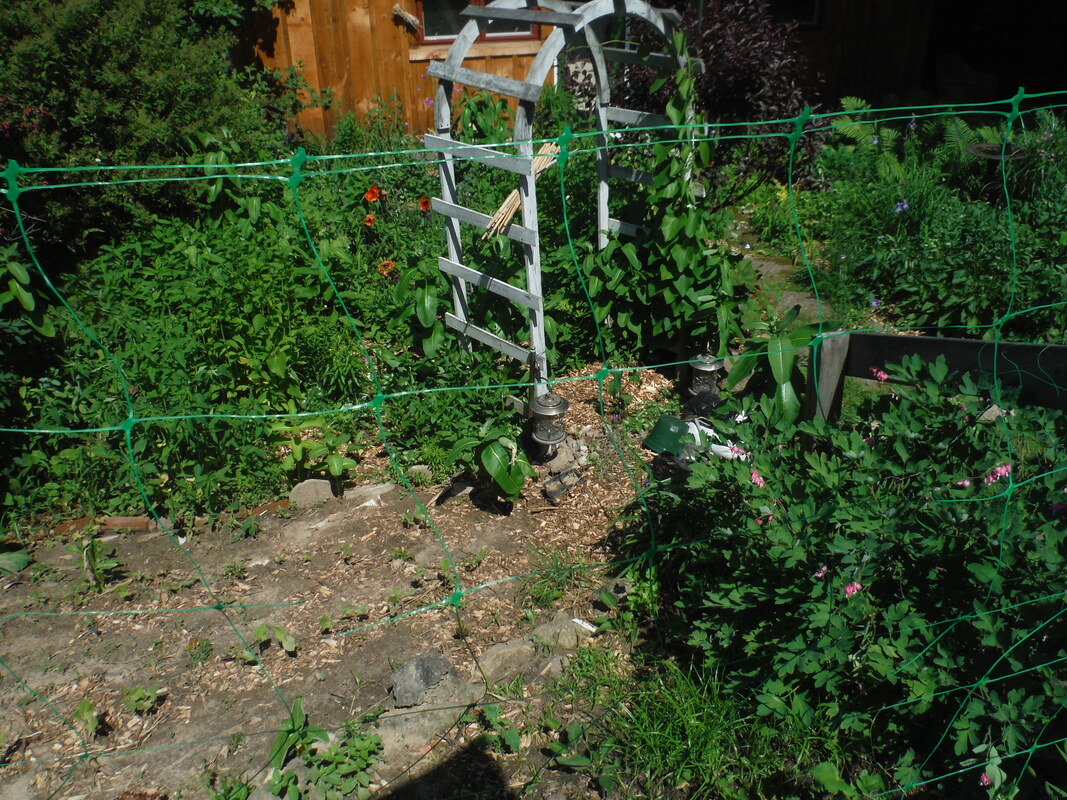 Vegetable garden Vegetable garden Deborah owns three properties in Dundas and considers her gardens something of a laboratory. “Everything is an experiment in the evolution of these gardens," she says. "I plant it here and move it to the other gardens and that’s how I populate them.” As well as feeding pollinators, Deborah is beginning to feed herself, her family and friends and neighbours with produce from her vegetable gardens. “It’s a community-building opportunity for me. It soothes my heart and warms my soul.” Deborah practices permaculture gardening and the idea of “multipurpose plants”--plants that feed the birds and the bees, and us! She is deeply interested in succession planning and maximizing the growing season. As such, she plans to convert her bushes to a “food hedge” of fruit and vegetables around the perimeter of the garden, as well as utilize the space “in an efficient way with foods that grow up,” such as zucchini and cucumbers. She will be starting small, “testing, getting results and expanding further.” We continue our blog post series featuring Monarch Awards' and Caterpillar Awards' winners 2019 in the hope that you too will be inspired to apply this year. In this post, we hear from Lucy Dubeckyj, Caterpillar Award recipient (of the Hamilton Monarch Awards). Lucy owns a small greenhouse manufacturing business in Dundas. She has always appreciated pollinators. When Lucy heard about the Hamilton Monarch Awards, she applied immediately: “I have never been interested in a Trillium Award, but this one, I could get behind.” Lucy has been a gardener for a while. When she faced a transitional point in her life, gardening was her therapy and she started digging and planting; "you have total control over your plants, where and how they go, they don’t talk back.”
In choosing her plants, Lucy goes by intuition: “I go with how I feel, I don’t know the names of everything I plant--so this plant is from my sister Stella, that one from my neighbour, Barb.” Although Lucy appreciates order to a garden, “there is a little bit of room for chaos. I like to surprise visitors when they visit my gardens.” Tina Cooper, Caterpillar Award 2019 recipient (of the Hamilton Monarch Awards). Tina has been gardening for twenty-five years. Previously, she lived in the country on an acre of land, converting grass to flower beds. She moved ten years ago to Ancaster. Her current property backs onto a ravine where she enjoys watching the wildlife this setting attracts. “It’s an oasis,” Tina describes her garden. “It gives us so much pleasure to sit there; at any moment, you’re not sure what you’re going to see.” Tina has been busy improving the soil with compost and replacing plant material “with things that have more value for nature.” She has been creating areas that benefit nature, piling up wood, providing bird nesting spaces as well as water-baths for birds to drink from.
“In the last few years, I’ve come to learn more from associating with native plants,” Tina says. Some of her favourites include Beardtongue, Anemones, Bee Balm and Turtlehead. She buys many of her plants from Ontario Native Plants and plans to get more from here, this growing season to plant in the front yard. |
Archives
December 2023
Categories |
|
|
Butterflyway Hamilton: www.facebook.com/butterflywayhamilton/
Environment Hamilton: https://www.environmenthamilton.org/ Hamilton Naturalists' Club: https://hamiltonnature.org/ |

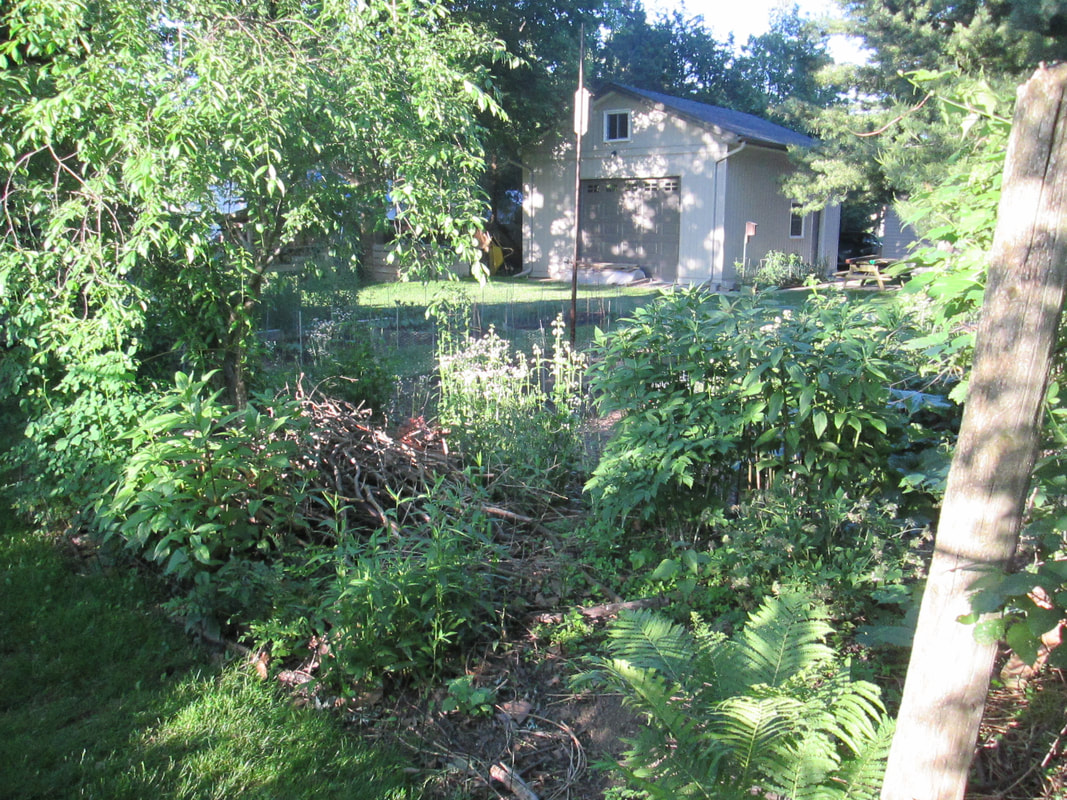
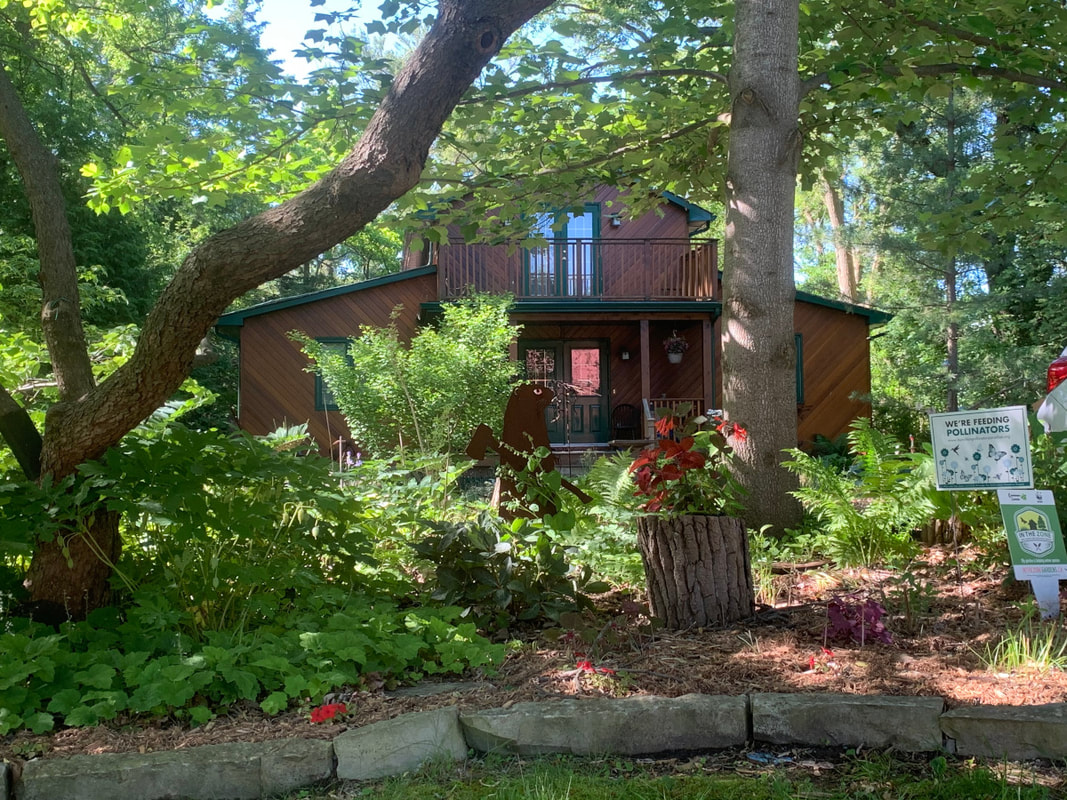

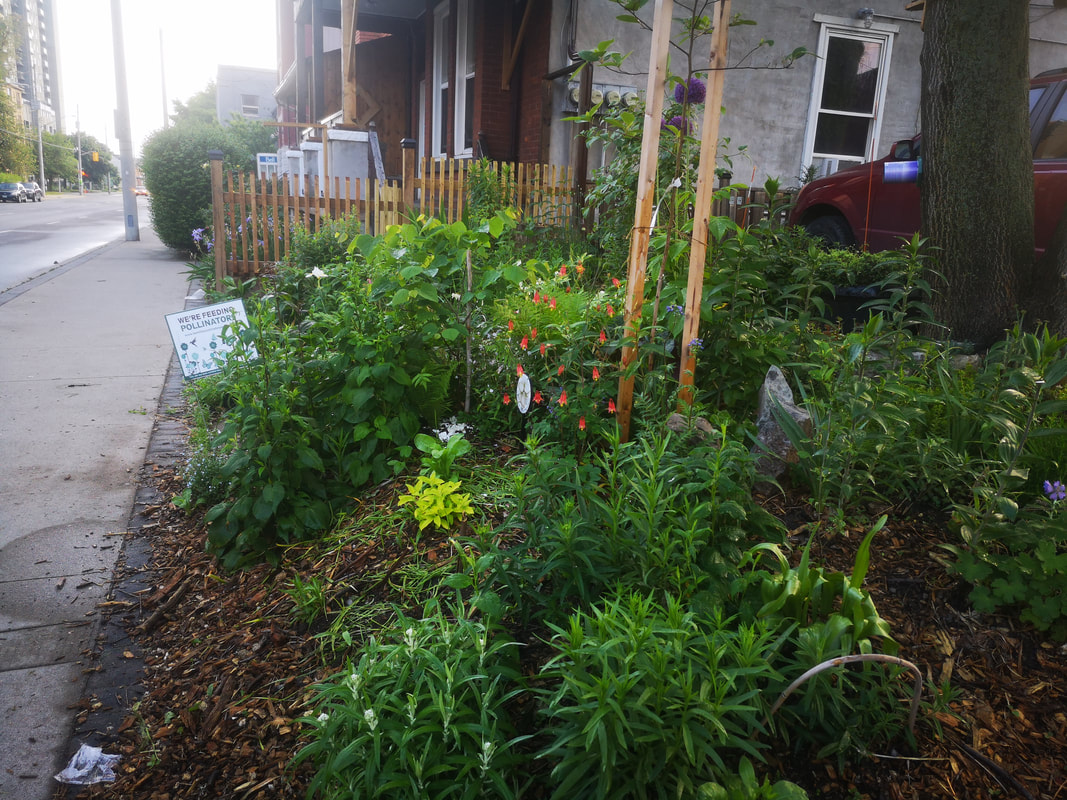
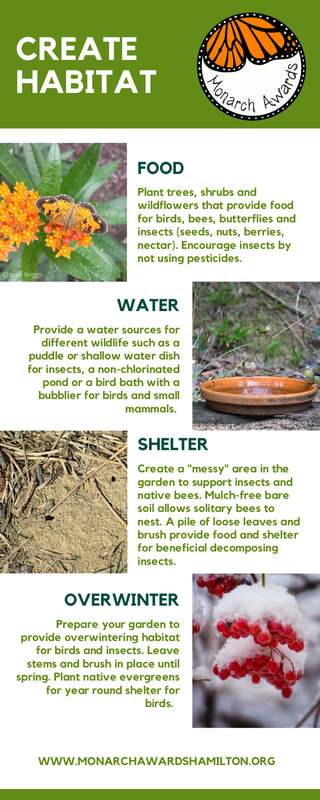
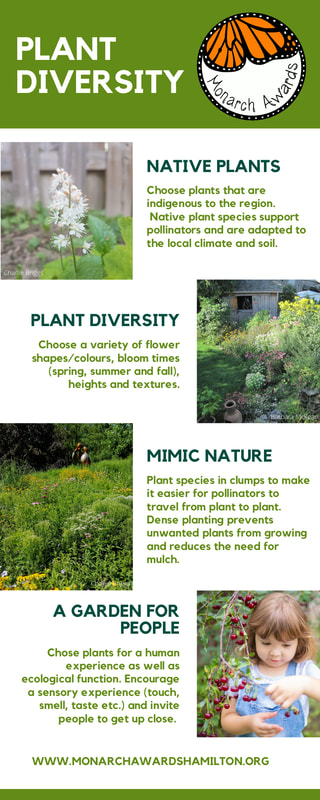
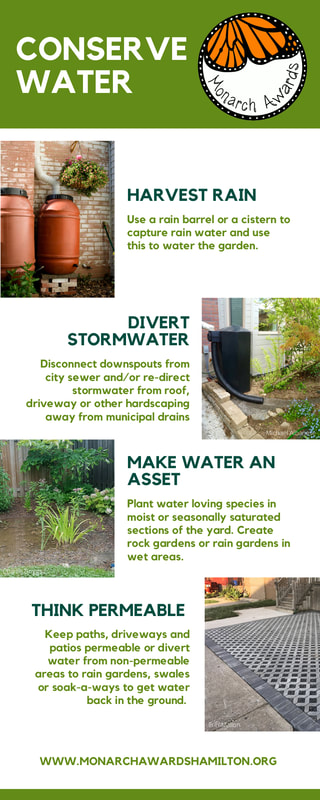

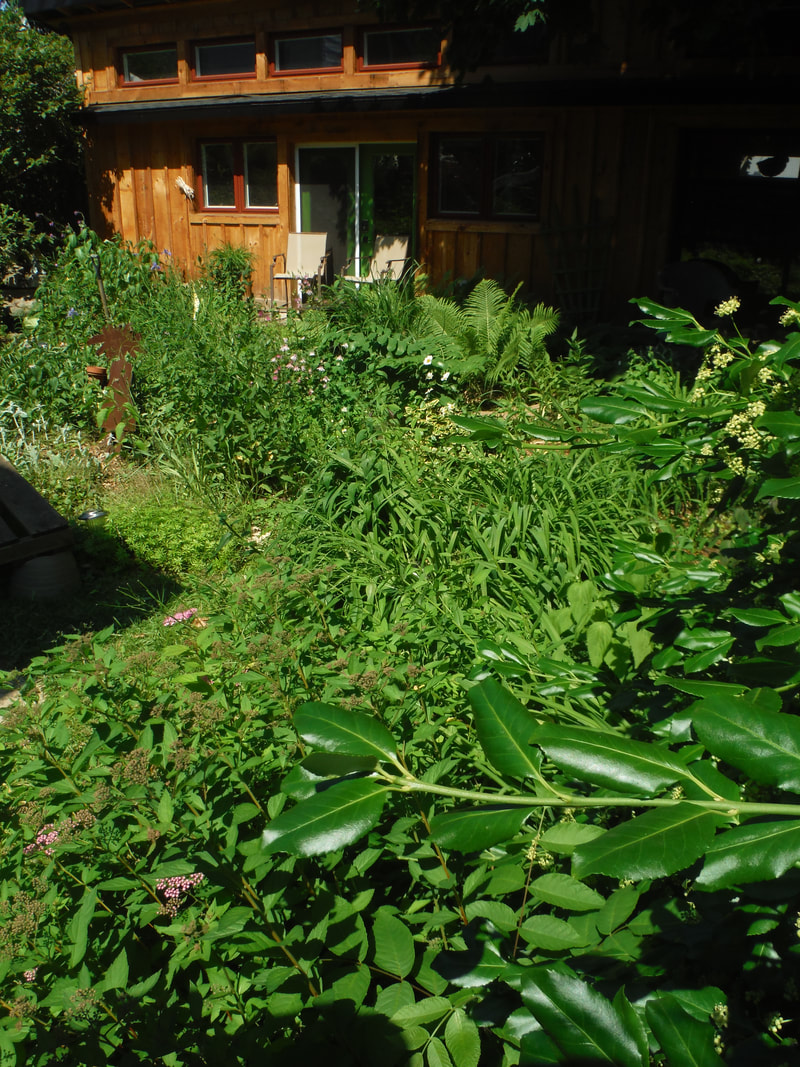
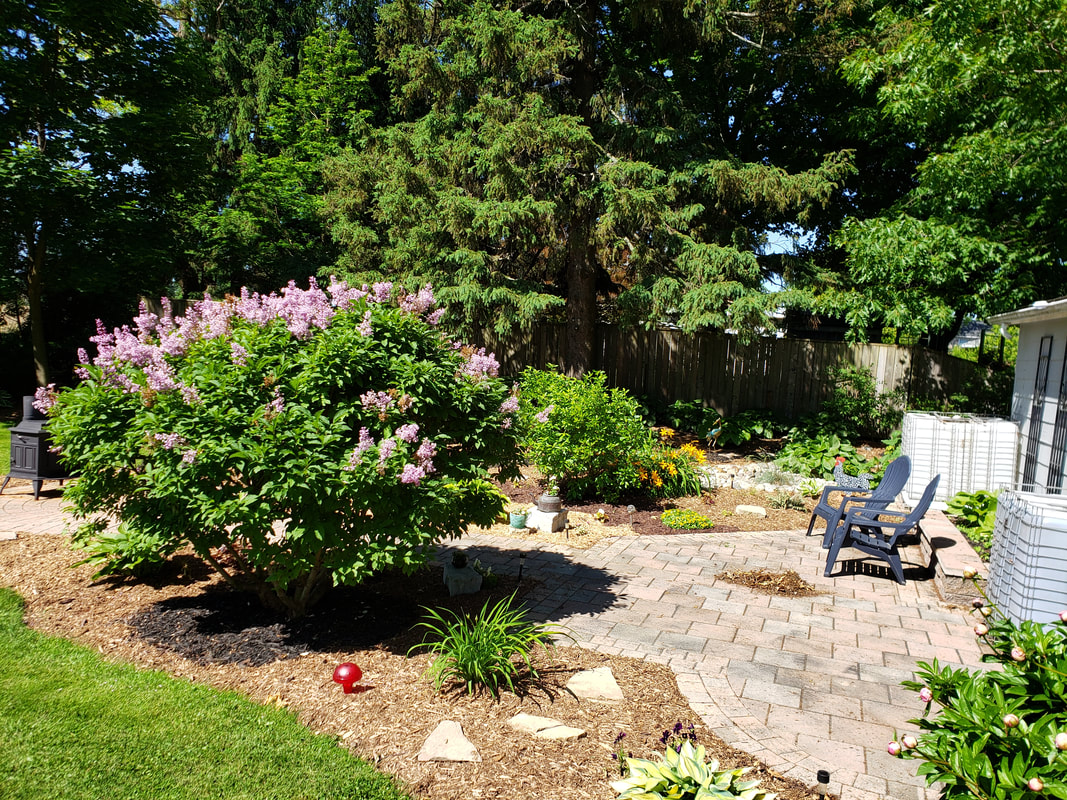
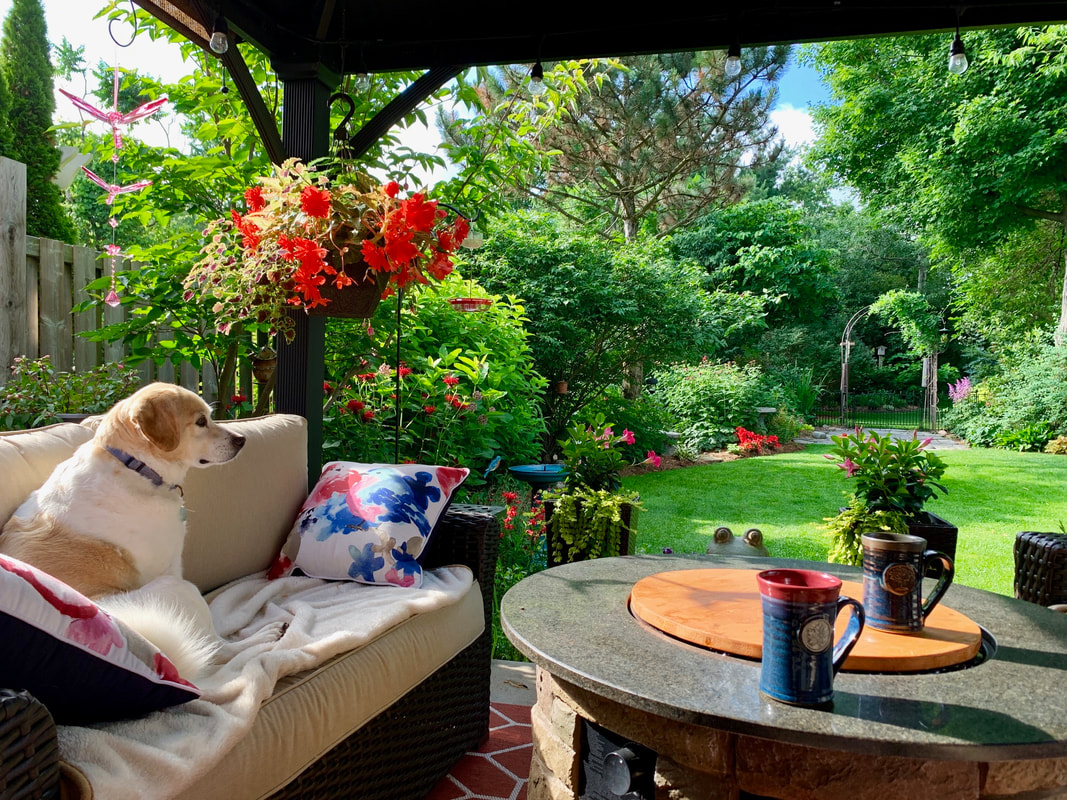
 RSS Feed
RSS Feed